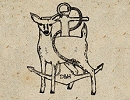Antiques for Sale | Antique Furniture | Antique Fairs | Antiques Listings | Antiques Email Alerts | Websites for Antique Dealers | Contact

Doe and Hope
Tel : +44 (0)1767 640995, Mobile: +44 (0)7729 213013
Email : info@doeandhope.com
Web : www.doeandhope.com
Web : www.antiques-atlas.com/doeandhope/
Private dealer, by appointment
The Onion Barn, Shoe Cottage
15 High Street, Blunham,
Bedfordshire, MK44 3NL.
Please don't hesitate to contact us for an appointment.
Fine French Terracotta Portrait Bust M.HIOLLE 1896



Description
In original condition, the exceptionally well modeled patinated terracotta bust of a gentleman, almost certainly that of Jean-Baptiste Carpeaux (1827–1875), shown in three-quarter length, facing slightly to sinister, with a full head of tousled hair, moustache and beard, wearing a buttoned waistcoat, shirt, cravat and overcoat, sculpted by Maximilien-Henri Hiolle and signed and dated 'M. HIOLLE 1896', the bust mounted on the original(?) fine quality verde-antico marble socle, survives from late nineteenth century France.The condition of the bust is largely good throughout. There are no signs of major damage or restoration so he remains in nice un-meddled with order with some slight blemishes all in keeping for good character. There is some loss to the extremities on the moustache and to one small section of the hair. He remains stable and sound as does the socle.
This very sensitive portrait exhibits a tenderness and warmth that was obviously felt towards the sitter. The attention to the details of the coiffure, moustache, and waistcoat indicate Hiolle’s skill at utilising the vocabulary of sculpture in relief.
The French sculptor Maximilien-Henri Hiolle (1843-1934), was the younger brother of the more famous Ernest-Eugène Hiolle. He studied at the Ecole Académique in Valienciennes before entering the studio of François Jouffroy at the Ecole des Beaux-Arts in Paris and was a debutant in the Salon of 1869. After the Franco-Prussian War and the Commune, he participated in various building projects around Paris, including the Palais Garnier and Hotel de Ville, which had been destroyed during the Commune. Hiolle became a Chevalier of the Légion d’honneur in 1873 and was awarded the medal of honor in the Exposition Universelle of 1878. Among his many portrait busts, he sculpted one of Charles Garnier and his teacher Francois Jouffroy. A white marble figure by Maximilien-Henri Hiolle of Marie-Adelaide De Savoie as Diana the Huntress, dated to 1890, sold for 52,565 euros at Sotheby’s in 2002.
We believe this portrait to be of Jean-Baptiste Carpeaux (1827–1875) as it has a striking resemblance to the bust of the same at Saint Roch cemetery, which was executed by his older brother Ernest. Jean-Baptiste Carpeaux was taken from his tomb at Auteuil to be transferred to the cemetery of Valenciennes and its tomb was designed by the architect Ernest Thibaut. The bust, which adorns it, is by Ernest Hiolle and shows Carpeaux in a very similar poise, though the bust was rendered in bronze. Maximilian was also the author of his brother's bust at the cemetery of Valenciennes.
One of the most innovative of all 19th-century sculptors, the French Romantic artist Jean-Baptiste Carpeaux was a pupil of Francois Rude (1784-1855), and is seen as a precursor to Auguste Rodin (1840-1917) and Medardo Rosso (1858-1928). He produced large scale works of sculpture such as Ugolino and His Sons (1860, Musee d'Orsay, Paris), as well as the more controversial La Danse (1866-9, Musee d'Orsay), and was also known for his small intimate portrait sculptures such as Antoine Watteau (1863, bronze, Musee d'Orsay) and La Negresse (1872, bronze, Metropolitian Museum of Art, New York). Influenced by Italian Renaissance sculpture, Carpeaux was an important figure in 19th century French art, because his expressive romanticism and vigorous approach to modelling marked a definite break from the austere style of Neoclassical sculpture, and paved the way for the naturalism of Rodin. A later shift in taste toward a freer and more naturalistic style is exemplified by his work, breaking with traditional approaches to historical subjects and portraiture Carpeaux infused his sculpture with a previously unseen freedom and immediacy.
It is also possible that this work is of his older brother Ernest-Eugène Hiolle (5 May 1834 - 5 October 1886) who specialized in classical and allegorical figures in plaster and bronze, as well as many contemporary portrait busts and he studied at the École Academique in Valenciennes before entering the studio of Francois Jouffroy at the École des Beaux-Arts in Paris. There is a known cast plaster plaque, which shows Ernest-Eugene in profile with the same flowing locks and type of clothing as we see here in our bust, namely the cravat and waistcoat which is dated to 1885. In that plaque he doesn’t appear to have a beard, so we are inclined to believe this bust is much more likely to be of Carpeaux. It does show the same attention to detail to the ample coiffure with the movement of the hair so wonderfully fluid. The brothers were obviously very close and they both rest in a family tomb of the 91st division of Père Lachaise in Paris, with a bust of each brother standing respectively over the other.
An exceptionally fluid sculpture by an acclaimed listed artist and one that would merit further research.
DateLate 19th Century :
c.1896
Codeas155a1584 / 1626
Price SOLD £5800.00
StatusSold
SellerDoe and Hope
Telephone07729 213013Non UK callers :+44 7729 213013 Emailinfo@doeandhope.com
Contact
Send Doe and Hope a message about this item here





